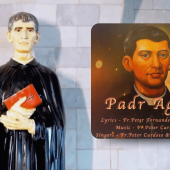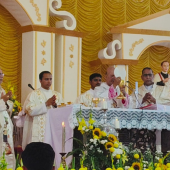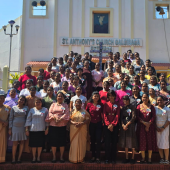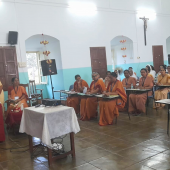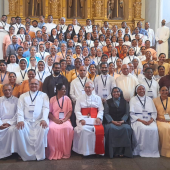Samvad in Goa Highlights Compassion as a Common Path Across Religions
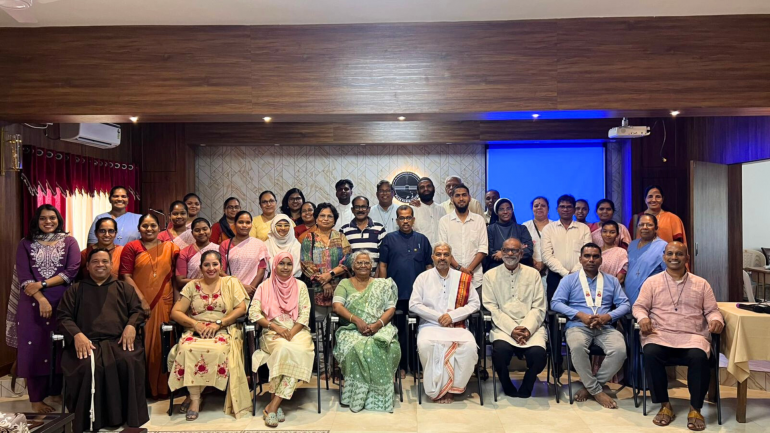
Sadbhav of the Society of Pilar, in collaboration with the Conference of Religious India (Goa Unit) and the Solidarity Forum of Pilar Seminary, organised Samvad, a theological dialogue on the theme “Compassion Across Faiths: Building Bridges in a Divided World,” at the Pilar Pilgrim Centre in Goa, western India, on November 15.
It coincided with the commemoration of the 98th death anniversary of Venerable Agnelo de Souza.
Sadbhav is an endeavour of the Society of Pilar for fostering interreligious dialogue, harmony, solidarity, and fellowship.
The programme aimed at fostering dialogue among representatives of different faiths on how compassion is interpreted, practiced, and applied in contemporary society. The panelists included Akila Sadik Bepari, Clinical Psychologist and Alternative Medicine Therapist; Dr. Mahesh Pednekar; Dhamachari Prajnacakshu; Prof. Joan Rebello, retired Professor of English at Shree Damodar College, Margao; Satish Gawde, Assistant Professor in Sanskrit, Swami Brahmanand Mahavidyalaya, Kundaim, Goa; and Smriti Bhambra, Corporate Manager, Learning and Development.

Heart of Islamic Teaching
Presenting the Islamic view, Ms. Akila Sadik Bepari explained that compassion is a core belief and way of life in Islam, rooted in the divine nature of God, who is called Rahman (Merciful) and Raheem (Compassionate). She stated that compassion is not limited to emotion, but is expressed through mercy, justice, equality, responsibility, and care for all creation.
She highlighted that even the daily greeting “Assalamu Alaikum” (Peace be upon you) is itself a prayer of peace and goodwill offered to every human being. Quoting Prophet Muhammad, she recalled: “The Most Merciful shows mercy to those who are merciful.”
Ms. Bepari concluded that true Islamic compassion is inclusive, active, and continuous, aiming at peace, dignity, and the welfare of all.
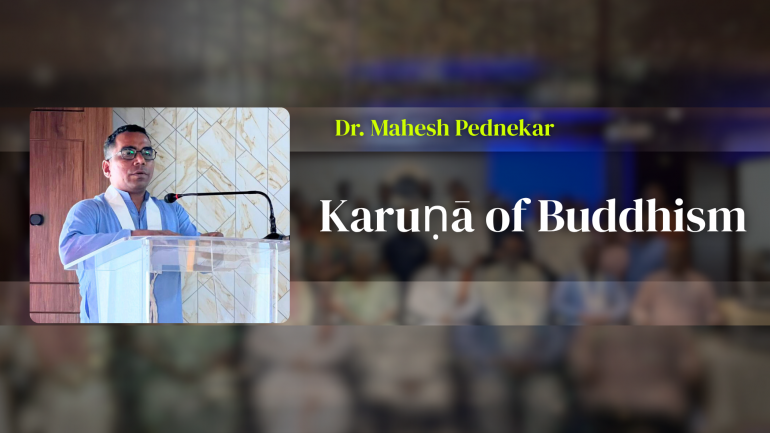
Karuṇā of Buddhism
Dr. Mahesh Pednekar presented the Buddhist understanding of compassion, using the term karuṇā, which he described as “the quivering of the heart in response to suffering, with a committed intention to alleviate it, not mere pity.” He explained that compassion is one of the four Brahmavihāras, mettā, karuṇā, muditā, and upekkhā, noting that “compassion without equanimity becomes emotional burnout, and equanimity without compassion becomes indifference.”
He pointed out that Buddhist compassion has two dimensions: compassion for those who suffer and compassion for those who cause suffering, because “ignorance is the root of harmful actions.” Buddhists are trained to cultivate goodwill for all beings through disciplined meditation.
Dr. Pednekar concluded that “true Buddhist compassion is rooted in wisdom, the insight into non-self and interdependence, and therefore must be boundless, inclusive, and impartial.”
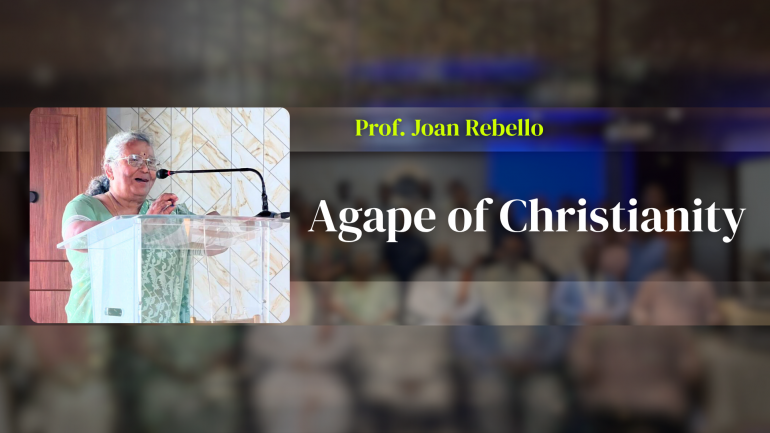
Agape of Christianity
Prof. Joan Rebello emphasised that compassion is a core value across religions and philosophies, explaining that it means “to suffer with”, entering another’s pain with a desire to heal, rather than merely feeling sorry. Referring to Christianity’s foundation in agape and Jesus’ commandment of love, she pointed to the Good Samaritan and the ethic “Do unto others as you would have them do unto you” as models of compassion beyond boundaries. She concluded by urging all to deepen, practise, and integrate compassion in personal life, community, and interfaith efforts.
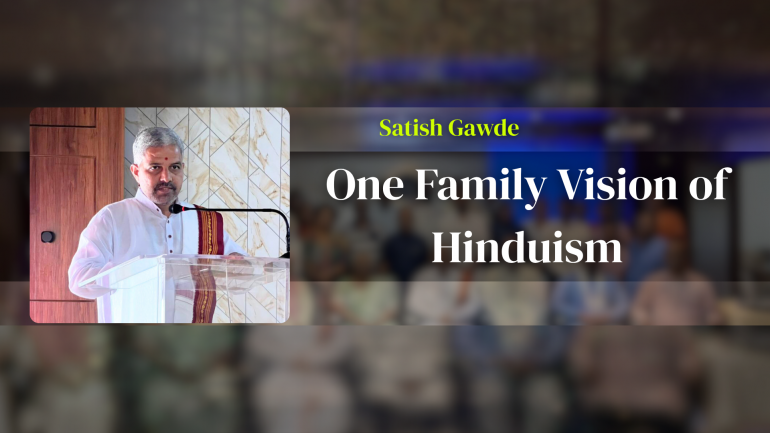
One Family Vision of Hinduism
Satish Gawde explained that Hinduism strongly promotes compassion as a spiritual value rooted in its sacred tradition. However, he lamented that modern society has moved towards individualism, stating, “Today we think only of ourselves… we expect others to show compassion to us, but we fail to help others.”
He recalled that the Hindu holy books encourage cooperation, mutual respect, and shared responsibility. Gawde highlighted the ancient Hindu ideal Vasudhaiva Kutumbakam, “the world is one family”, and stressed that “when we help each other, we will be good and will never hate people of other faiths.”
He added that consistent acts of care and cooperation will inspire future generations: “Our future generation will learn this… there will be a change in society.” He concluded that doing good to all, regardless of religion, reflects true Hindu morality and contributes to realizing Vasudhaiva Kutumbakam in society.
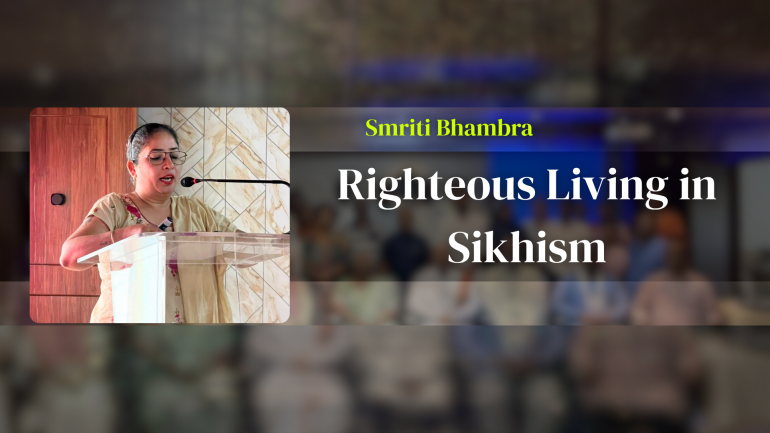
Righteous Living in Sikhism
Smriti Bhambra emphasised that compassion is considered the basis of righteous living in Sikh philosophy. She explained that Sikhism, founded by Guru Nanak Dev Ji and nurtured through ten Gurus, teaches belief in one universal, formless God and rejects discrimination based on caste, creed, gender, or race. The spiritual foundations of Sikh life, Naam Japna (remembering God), Kirt Karni (honest work), and Vand Chhakna (sharing with others), all reflect a life rooted in compassion.
Quoting Guru Nanak Dev Ji, she highlighted the principle that compassion must become part of one’s inner character and daily conduct: “Let compassion be your cotton, contentment your thread, modesty your knot, and truth your twist.” Compassion, she explained, is not sentiment or pity but a spiritual way of living, shaping both personal character and social responsibility.
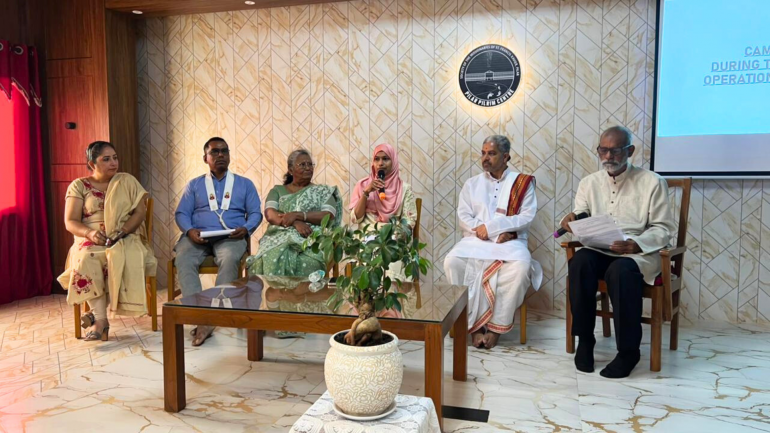
Love and Compassion
The panel discussion was moderated by Dr. Andre Rafael Fernandes, retired Professor of English, Goa University. In his concluding remarks, Dr. Fernandes stressed that real change must begin with individual responsibility. He stated that what is happening in the world calls each person to make a personal commitment to interreligious dialogue and mutual understanding, as only such commitment can lead society forward. He further observed that one’s commitment to doing good reflects the kind of life one chooses to live.
Fr. Gabriel Fernandes OFM (Cap), President of CRI (Goa Unit), congratulated the Pilar Fathers for organising Samvad and emphasized, in his address, that love is the foundation of compassion.
The panel discussion began with the symbolic watering of a plant by representatives of different faiths and concluded with the Sadbhav Anthem. Fr. Elvis Fernandes SFX, Convenor of Sadbhav, welcomed the gathering. A vote of thanks by Irene George, Counsellor at Fr Agnel College, Pilar, brought the enriching event to a close. The programme was anchored by Janessa D’Melo.
Radio Veritas Asia (RVA), a media platform of the Catholic Church, aims to share Christ. RVA started in 1969 as a continental Catholic radio station to serve Asian countries in their respective local language, thus earning the tag “the Voice of Asian Christianity.” Responding to the emerging context, RVA embraced media platforms to connect with the global Asian audience via its 21 language websites and various social media platforms.









